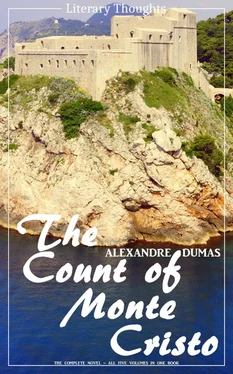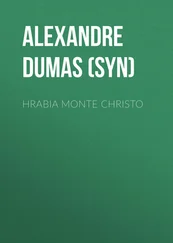"Sire, sire," murmured the minister, "for pity's" –
"Approach, M. de Villefort," resumed the king, addressing the young man, who, motionless and breathless, was listening to a conversation on which depended the destiny of a kingdom. "Approach, and tell monsieur that it is possible to know beforehand all that he has not known."
"Sire, it was really impossible to learn secrets which that man concealed from all the world."
"Really impossible! Yes – that is a great word, sir. Unfortunately, there are great words, as there are great men; I have measured them. Really impossible for a minister who has an office, agents, spies, and fifteen hundred thousand francs for secret service money, to know what is going on at sixty leagues from the coast of France! Well, then, see, here is a gentleman who had none of these resources at his disposal – a gentleman, only a simple magistrate, who learned more than you with all your police, and who would have saved my crown, if, like you, he had the power of directing a telegraph." The look of the minister of police was turned with concentrated spite on Villefort, who bent his head in modest triumph.
"I do not mean that for you, Blacas," continued Louis XVIII.; "for if you have discovered nothing, at least you have had the good sense to persevere in your suspicions. Any other than yourself would have considered the disclosure of M. de Villefort insignificant, or else dictated by venal ambition," These words were an allusion to the sentiments which the minister of police had uttered with so much confidence an hour before.
Villefort understood the king's intent. Any other person would, perhaps, have been overcome by such an intoxicating draught of praise; but he feared to make for himself a mortal enemy of the police minister, although he saw that Dandre was irrevocably lost. In fact, the minister, who, in the plenitude of his power, had been unable to unearth Napoleon's secret, might in despair at his own downfall interrogate Dantes and so lay bare the motives of Villefort's plot. Realizing this, Villefort came to the rescue of the crest-fallen minister, instead of aiding to crush him.
"Sire," said Villefort, "the suddenness of this event must prove to your majesty that the issue is in the hands of Providence; what your majesty is pleased to attribute to me as profound perspicacity is simply owing to chance, and I have profited by that chance, like a good and devoted servant – that's all. Do not attribute to me more than I deserve, sire, that your majesty may never have occasion to recall the first opinion you have been pleased to form of me." The minister of police thanked the young man by an eloquent look, and Villefort understood that he had succeeded in his design; that is to say, that without forfeiting the gratitude of the king, he had made a friend of one on whom, in case of necessity, he might rely.
"'Tis well," resumed the king. "And now, gentlemen," he continued, turning towards M. de Blacas and the minister of police, "I have no further occasion for you, and you may retire; what now remains to do is in the department of the minister of war."
"Fortunately, sire," said M. de Blacas, "we can rely on the army; your majesty knows how every report confirms their loyalty and attachment."
"Do not mention reports, duke, to me, for I know now what confidence to place in them. Yet, speaking of reports, baron, what have you learned with regard to the affair in the Rue Saint-Jacques?"
"The affair in the Rue Saint-Jacques!" exclaimed Villefort, unable to repress an exclamation. Then, suddenly pausing, he added, "Your pardon, sire, but my devotion to your majesty has made me forget, not the respect I have, for that is too deeply engraved in my heart, but the rules of etiquette."
"Go on, go on, sir," replied the king; "you have to-day earned the right to make inquiries here."
"Sire," interposed the minister of police, "I came a moment ago to give your majesty fresh information which I had obtained on this head, when your majesty's attention was attracted by the terrible event that has occurred in the gulf, and now these facts will cease to interest your majesty."
"On the contrary, sir, – on the contrary," said Louis XVIII., "this affair seems to me to have a decided connection with that which occupies our attention, and the death of General Quesnel will, perhaps, put us on the direct track of a great internal conspiracy." At the name of General Quesnel, Villefort trembled.
"Everything points to the conclusion, sire," said the minister of police, "that death was not the result of suicide, as we first believed, but of assassination. General Quesnel, it appears, had just left a Bonapartist club when he disappeared. An unknown person had been with him that morning, and made an appointment with him in the Rue Saint-Jacques; unfortunately, the general's valet, who was dressing his hair at the moment when the stranger entered, heard the street mentioned, but did not catch the number." As the police minister related this to the king, Villefort, who looked as if his very life hung on the speaker's lips, turned alternately red and pale. The king looked towards him.
"Do you not think with me, M. de Villefort, that General Quesnel, whom they believed attached to the usurper, but who was really entirely devoted to me, has perished the victim of a Bonapartist ambush?"
"It is probable, sire," replied Villefort. "But is this all that is known?"
"They are on the track of the man who appointed the meeting with him."
"On his track?" said Villefort.
"Yes, the servant has given his description. He is a man of from fifty to fifty-two years of age, dark, with black eyes covered with shaggy eyebrows, and a thick mustache. He was dressed in a blue frock-coat, buttoned up to the chin, and wore at his button-hole the rosette of an officer of the Legion of Honor. Yesterday a person exactly corresponding with this description was followed, but he was lost sight of at the corner of the Rue de la Jussienne and the Rue Coq-Heron." Villefort leaned on the back of an arm-chair, for as the minister of police went on speaking he felt his legs bend under him; but when he learned that the unknown had escaped the vigilance of the agent who followed him, he breathed again.
"Continue to seek for this man, sir," said the king to the minister of police; "for if, as I am all but convinced, General Quesnel, who would have been so useful to us at this moment, has been murdered, his assassins, Bonapartists or not, shall be cruelly punished." It required all Villefort's coolness not to betray the terror with which this declaration of the king inspired him.
"How strange," continued the king, with some asperity; "the police think that they have disposed of the whole matter when they say, 'A murder has been committed,' and especially so when they can add, 'And we are on the track of the guilty persons.'"
"Sire, your majesty will, I trust, be amply satisfied on this point at least."
"We shall see. I will no longer detain you, M. de Villefort, for you must be fatigued after so long a journey; go and rest. Of course you stopped at your father's?" A feeling of faintness came over Villefort.
"No, sire," he replied, "I alighted at the Hotel de Madrid, in the Rue de Tournon."
"But you have seen him?"
"Sire, I went straight to the Duc de Blacas."
"But you will see him, then?"
"I think not, sire."
"Ah, I forgot," said Louis, smiling in a manner which proved that all these questions were not made without a motive; "I forgot you and M. Noirtier are not on the best terms possible, and that is another sacrifice made to the royal cause, and for which you should be recompensed."
"Sire, the kindness your majesty deigns to evince towards me is a recompense which so far surpasses my utmost ambition that I have nothing more to ask for."
Читать дальше












